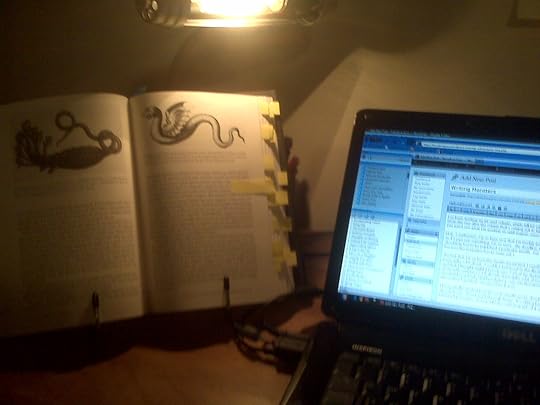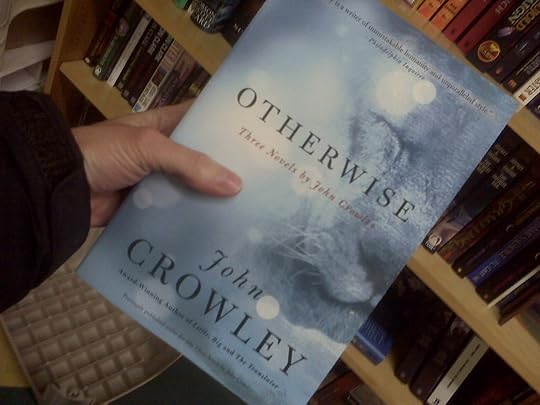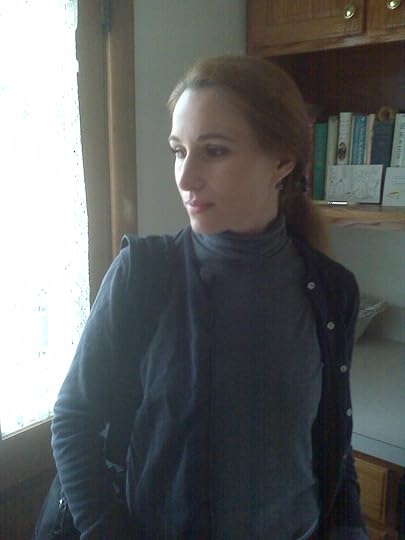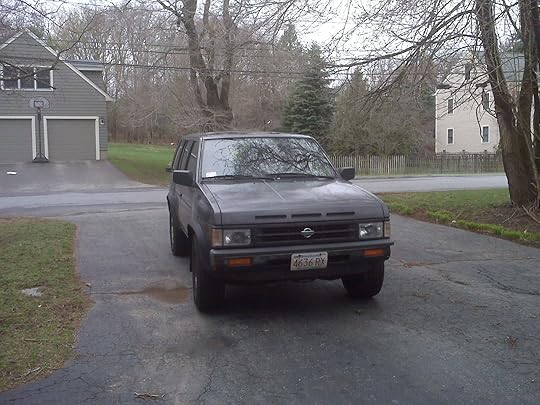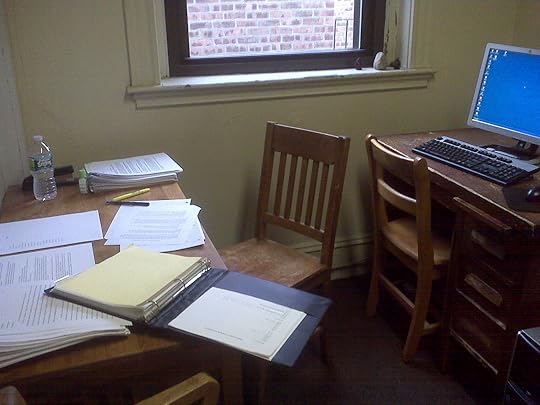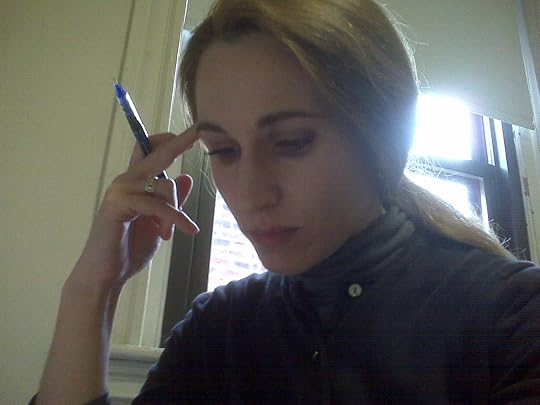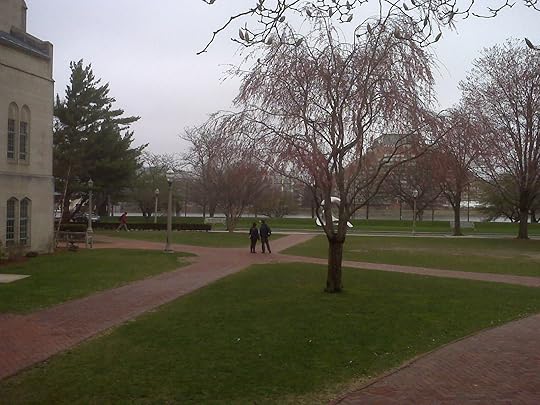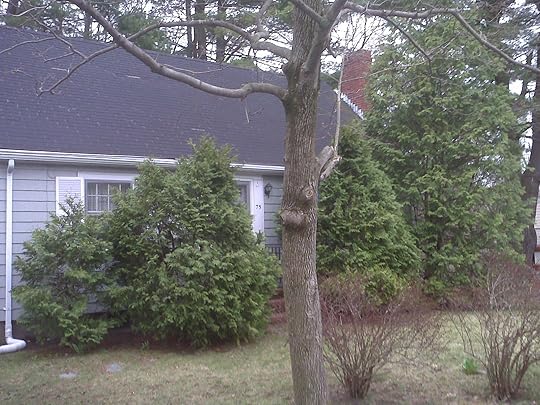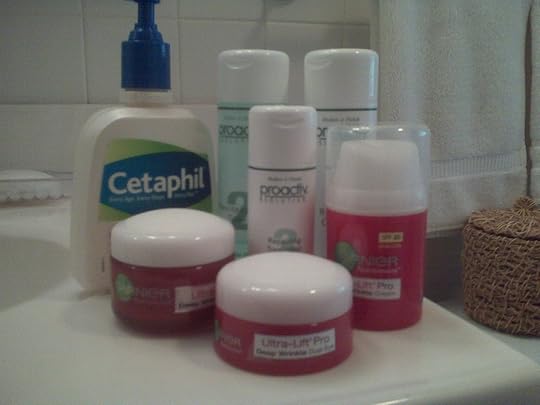Theodora Goss's Blog, page 61
April 28, 2011
Writing Monsters
I had no idea how much fun writing the Folkroots column for Realms of Fantasy would be.
I've been working on my next column, which will be called "A Brief History of Monsters." By next, I mean the one after the column that's coming out in June, which is called "Fairies and Fairylands." So you won't see what I'm working on until August, sorry! But I'll tell you a little about it.
First, a confession: I'm so right busy now that I'm terribly behind at anything that doesn't have a hard deadline. So if I owe you something, I'm so sorry. (By hard deadline, I mean a publication deadline. Something that absolutely has to be published a particular month. For example, the column has a hard deadline because the magazine has to come out.)
The fact that I'm so busy this month meant that I needed to write a column on something I already knew quite a lot about. I couldn't just head to the library and research anything that interested me, and that I thought might interest you. Part of my doctoral dissertation focuses on monsters in the nineteenth century, so I'd already done quite a lot of research on monsters, and I knew there was a wonderful new book, Stephen Asma's On Monsters, that contained a lot of the information I wanted. So, monsters it was.
I knew what I wanted to write, and actually wrote about half of the column based simply on what I already knew. Then I went through Asma. It's sitting beside me as I type this, with stickies marking important passages. In fact, I'll take a photograph of it right now and include it at the end of this post. And then, to make sure I was considering all the monsters out there, I enlisted the help of my Facebook friends and asked them to name important monsters to make sure I hadn't missed any. (Thank you, Facebook friends! You are all awesome! And you know, I hadn't even though of the hulda as a monster. But a cow-tailed woman certainly qualifies.)
Earlier today, I went to the library to pick up some books: a general theoretical work on monsters, a book on Greek and Roman monsters, two books on monsters in the Middle Ages, and Jorge Luis Borges' The Book of Imaginary Beings. I don't know how much information I'm going to take from them. After all, I have a 4500 word limit, and I already have about half of that written. But they will help me check and double-check the information I'm including.
Yes, it's stressful – all the work I need to do at the end of the semester. And yes, writing a column is added stress. But it's also what I do when I take a break, when I need to do something fun for a while. Because it really, truly is fun to read about monsters and then write about them in a way I think Realms of Fantasy readers will find accessible, scholarly, and interesting.
I love this work!








April 26, 2011
Incorporating Failure
Today, I taught a class of students who were preparing portfolios of the work they had done over the course of the semester. We spent the class going over the portfolios, discussing how they could better organized the documents they were going to incorporate, that sort of thing. I found that many of them were leaving out documents they thought did not represent their best work.
And so I gave a sort of impromptu lecture on the importance of incorporating failure.
I mentioned the importance of failure in the blog post "Thoughts on Writing," which I posted earlier this week. But I want to emphasize it again because I believe it's particularly important for writers. Here's what I believe about failure:
You're going to fail.
You're going to fail a lot.
And that's good, because no one ever succeeded at anything worthwhile without failing at it. Every time you write a story, you will have discovered ways not to write that story. Those ways will be your drafts, and in a sense they will be failures. They will never be published, unless you are T.S. Eliot and someone publishes your original draft of The Waste Land (which, by the way, is just embarrassing) before Ezra Pound came along and fixed it for you.
Some years ago, there was an exhibit of Pablo Picasso's paintings at the Museum of Fine Arts. It was an enormous exhibit. The most fascinating paintings were the early ones, in which Picasso systematically went through the styles of both ancient and contemporary painters, imitating each one. I think he was learning what he could from them, incorporating their lessons and then passing on. In the process, he was also learning how not to be Picasso so that he could, eventually, be Picasso. In a sense, those paintings are failures. They are certainly not the paintings any museum would want to hang up as a Picasso. But they are fascinating for us as artists. (Let us go then, you and I. We artists. Having mentioned Eliot, I now have scraps of his poetry floating around in my head.)
So, assuming that I'm right and you're going to fail (a lot, remember), you need to figure out how to accept failure. How to fit it into the narrative of your self and your art (since we all create narratives, and narratives are how we understand the world). What story will you tell yourself about failure? (Anthony Robins would be so proud of me here. I'm speaking like a motivational speaker. But also like a writer who knows that the world is a story we're telling ourselves.)
Will you try to hide your failures? Or will you hold them up proudly, tell everyone: Hey, look, this is where I failed! In the larger effort of creating the art I wanted to create. This was my moment of failure, from which I learned – whatever it is you learned. How not to create a light bulb, as Thomas Edison discovered (many times).
In which case you're really redefining failure. Because anything you learn from isn't really a failure, is it? It's simply another moment when you learned how to do whatever it is you wanted. I don't think you learn more from failure than success. I think you can learn a great deal from success. But you can learn as much from failure. I know that I do.
(They say April is the cruelest month. All right, Eliot says so. There isn't all that much of April left, and I'm glad. My work is going well, I'm going to meet my deadlines, but I'm very, very tired. I think May is going to be so much better.)








April 25, 2011
Every Day
Kendrick told me this story. Once, the motivational speaker Anthony Robins was on a talk show. A caller called in, told him about a project he was considering, and asked what he could do to make it succeed. Robins told him, "Hang up and start working on it tonight. And then work on it tomorrow." The message was, if you want to succeed at something, start now and work on it every day.
That's what I'm trying to do with my writing. It's difficult right now because this is the end of the semester, and I have so many other responsibilities. Sixty-four students, for example. But I find that if I don't work on it every day, I get anxious.
I went to the doctor's office today, for my annual physical. Evidently, I am ridiculously healthy, blood pressure 104/70, everything else as it should be. The only real problem I have is stress. A friend told me to take time off, take things easy. But I think that would actually make life more stressful for me. It would give me the sense that I wasn't working for what I wanted, that I wasn't moving in that direction. I want to feel that I am, every single day.
Which reminds me of something Dan Blank wrote on his blog:
"To build a successful business, we often look for balance.
"We look for safety, we look for the expected, we look for certainty. We try to find a process that works, that can be replicated. And we try to find ways success can fit into the hours of 9am-6pm on weekdays.
"But few things of great importance are done in a balanced way. Instead, they require vision, sacrifice, and boldness."
Writing, at least the way I want to do it, is a business. I want to do it that way because I want to prioritize it, and if I think of writing as an art, as something I do when I'm inspired, I find that I don't do it. I don't prioritize it. When I think, this is my career and I'm building it, one story, one essay, one novel at a time, then I think of it in the right way. And the art comes out anyway, because I want to create something of high quality. I don't want to let my readers down.
But I find that I can't look for balance. I'm not all that into balance anyway, as a person. When I wanted to learn to write, I went to both Odyssey and Clarion. That's not exactly balance, is it? It's closer to obsession.
Dan goes on,
"But one's success is often driven by two things: goals and purpose. And when dealing with the question of 'how can I fit this into my busy life,' the honest answer is: if you don't make the time, no one will make it for you. No one will make it easy for you to succeed. In fact, there are lots of people who will try to stop you, in their well-meaning ways: encouraging you to find balance; to not spend another weekend in the basement writing; that you are already doing enough; that maybe you aren't a writer after all. These discouragements come in tiny ways in regular conversations. Writers often know them well.
"Every success story of a creative individual is one of a long journey; of countless thankless hours of work when no one believed in you; of doing the impossible, which is often the most unsexy thing of all: jugging laundry, a family, a job, dinner, AND building your writing career.
"And I think that is true of all business, and most endeavors that we hope desperately to succeed in. You have to put in the hours. You have to prioritize and give up any sense of a balanced life."
Which reminds me that I need to do laundry. I will say that after a while, the discouragement stops. It stops when you sound like a professional writer, meaning someone who makes money from writing. At that point, people will stop trying to discourage you (with the best of intentions). After all, no one says to a lawyer, do you really need to work those long hours to succeed? Why don't you cut back and aim for balance? (You'd think they would, but they don't. Believe me, I've been there.)
This is a rambling post, isn't it? It's because I'm tired, and I'm writing this eating dinner (an organic chicken hot dog on a whole wheat bun, with a plate full of steamed vegetables, which is probably why my blood pressure is so low). It would be a lot more balanced to sit down, eat a relaxed meal. But after I type this, I have papers to grade and a column to work on.
Yes, it's an unbalanced life. Yes, it will get better, but I will continue to obsess about my writing – the quality of it, the business of it. In the meantime, I continue to work on it every day, because I have a vision of the life I want. And this is the way to get there.
In the meantime, Spring has come to New England. I know it happens every year, but this year it seems particularly meaningful. Most of the bulbs I planted have been nibbled by whatever lives in our yard (squirrels mostly, but also chipmunks). However, I will leave you with a picture of two hyacinths that have, actually, bloomed:








April 24, 2011
The Easter Basket
Last night, I bought Ophelia an Easter basket and filled it with Easter presents. Here's what it looked like:
When I had put it together, I realized what an unusual Easter basket it was. It contained a chocolate bunny, but also markers, a sticker book, Model Magic, craft sticks, a small notebook with butterflies on the cover, a sticky notepad, two Lego figures, tape, stickers with prices on them (for when she plays store), a compass, multicolored stickies, a logic game, and a white board.
What I had given her were mostly supplies of various sorts. Things she could make with. I've found that those are the best presents for her. And sure enough, this morning she figured out the logic game, and started making things with the rest.
I think there are people who have a compulsive drive to create, to make things that are new or to alter what they have. It's nice to see it in Ophelia. I see it in myself as well: when I buy something, I often end up altering it, making it into something I like better. Or I put it together with something else in an unexpected way. (Last fall, Ophelia and I picked up acorns and put them in a pressed glass bowl that sits on the dining room table. Eventually, she decided to paint some of the acorns, so now we have painted acorns in the pressed glass bowl. Although at the moment they have been replaced by a vase of tulips and are sitting on a shelf. But the creative life involves that sort of constant change. One day you have acorns, the next day they're painted various colors.)
When we moved into this house, I put some things in Ophelia's room, like the books I had growing up and books that Ophelia's been given:
But she did the actual decorating herself, which is why the walls look like this:
She made the silhouette in art class. The poster is for the BBC Narnia movies. The postcards stuck randomly on the wall are from art museums, and were chosen by her as decoration. They are scattered all over the room. And the dinosaur tapestry was one she asked me to make for her when she was several years younger, out of a pattern we found in a fabric store.
I bought myself an Easter present as well. Last night I had dinner at Asmara, the Eritrean restaurant in Cambridge, and afterward I walked across the street to Pandemonium (not the circle of Hell, but the science fiction and fantasy bookstore). And there I found a book by John Crowley that contains three of his novels, The Deep, Beasts, and Engine Summer:
I don't have an official Easter basket, but if I did, I think it would also contain supplies. Crowley's novels are supplies of sorts, because the most important thing I do, the most important aspect of my creative life, is writing. And all the things I read and experience go into that writing. So last night, I added the following to my tools: the taste of honey wine; the strange, spicy flavors of Eritrean food; how it feels to pick that food up with pieces of a flat, sour bread; how it feels to eat from a low table shaped like a mushroom; the taste of spiced tea; Cambridge at night, wet with rain; the glaring lights of a science fiction and fantasy bookstore, with gamers talking in the background; three novels by John Crowley. That's quite a lot to pick up, quite a lot in my Easter basket.








April 23, 2011
Summer Schedule
I'm starting to get a sense for my summer schedule. Here is what I'm going to be doing – I think. Some of this may change.
May 26-30, I will be at Wiscon. I will be leading a writing workshop, participating in a reading, and speaking on three panels (one of which I will be moderating).
June 23-24, I will be at teaching at the Odyssey Writing Workshop, .
July 14-17, I will be at Readercon.
In between those days, I need to schedule two things: a trip to New York to see Alexander McQueen: Savage Beauty at the Metropolitan Museum of Art, and a trip to San Francisco to see Pulp Fashion: The Art of Isabelle de Borchgrave at the Legion of Honor Museum. I'll be letting New York and San Francisco friends know when I'm there. Come join me if you'd like! (There may also be trips to Virginia and North Carolina, for business rather than art. But I'm not sure about those yet.)
I do already have my Wiscon schedule, so for those of you who are going, this is where you can find me:
On Friday, 9 a.m. to 12 p.m., I will be leading one of the writing workshops. Then, my convention schedule is as follows:
Sunday 10:00–11:15 a.m. Love and Hate and the End of the World. Reading with Kat Beyer, Haddayr Copley-Woods, Marguerite Reed, M. Rickert. Stories of love, hate, and maybe the end of the world by five women who have been there. Perhaps spaceships. Maybe ghosts. Probably not unicorns. Almost certainly demons.
Sunday 1:00–2:15 p.m. The Rise of the Anthology. Panel with Sharyn November (moderator), Alan John DeNiro, Eric M. Heideman, Catherine Lundoff. Every time you turn around, there's a new anthology out about faeries/steampunk/vampires/insert hot trendy topic here. Anthologies offer some great writing, but like so much else, sometimes the quality can be a little off. Are we living in the era of the anthology? How do anthologies get it right? How do they fail miserably? What does the "dream" anthology look like? Does it already exist? How do we feel about authors becoming editors of anthologies about their fictional universe?
Sunday 2:30–3:45 p.m. Fiction Writing in the Age of Fast Information. Panel with Fred Schepartz (moderator), Gwynne Garfinkle, Andrea D. Hairston, Naomi Kritzer, Ann Leckie. You're sitting at your computer writing your novel or short story. A question comes to mind. In days of yore, you would head to the library to get your answer. Now, you just Google it. A treasure trove of information is right there at your fingertips, but does it ever become a barrier to good writing and storytelling? Will writers skip the process of exhaustive research before they write a single word in favor of a process done on a need to know basis? Is that a problem? And with so much readily available information, are writers in danger of loading their work with trivia that adds little to the actual story?
Sunday 4:00–5:15 p.m. Where Is the Indigenous American Fantasy? Panel with Valerie Estelle Frankel, L J Geoffrion, Andrea D. Hairston, Georgie L. Schnobrich, Katherine Mankiller (and me as moderator). Why is American fantasy so Eurocentric? If you believe our fantasists, American cities are populated with imported Romanian vampires, Russian werewolves, Celtic faeries, Nordic gods, Germanic witches, and the (very) occasional African god or Arabic djinn, but scarcely a homegrown magical being to be found. In fact, indigenous magical beings abound in the Americas and their stories of magic, wonder and horror are widely told by spoken and written word. North American mythology is rich with magical beings. Do these stories get adequate air time? Is it easier to imagine an Old World teeming with supernatural beings than to visualize a North America enchanted with indigenous mythical beings? Is it difficult to believe that we live in a naturally magical place? And if we did, what would it look like?
Yes, my reading and all of my panels are on Sunday. I have no idea why. It's going to be a long day, though!
In addition to traveling, I'm going to be working on two important projects. The first will of course be my dissertation. The last chapter I need to revise is due May 15th, and after that I'll be putting the manuscript together, into what will hopefully be its final form. Then, I'm planning to defend in the fall, as early in the semester as I can. The second project will be a novel.
There are other things I'd like to do this summer, other projects I'd like to try. And here I need your help. I've been thinking of making some of my stories available as an ebook. And maybe some of my poems as well. I've also been thinking of making some YouTube videos, probably of me reading. Also some podcasts. But what I'd like to know is, what do you think? What should I do? Assuming I have the time, what projects would you like me to tackle? I'd really like to know.








Thoughts on Writing
On her blog Tribal Writers, Justrine Musk posted a sort of manifesto. It consists of a number of short statements, and several of them struck me. So I thought I would write about them.
Become your own revolution.
I think you have to. You can join a political revolution, believe in a shared vision of government or the state. But as an artist, you can have to express your own vision. You can't really do anything else. It's almost a default setting. You can protest as a group, but you create as an individual. We do join groups, of course we do. Artists get lonely. Although the ones being most creative also tend to create their own groups. Hence labels such as New Weird and Mythpunk. I love those sorts of groups, those sorts of labels, because I think they're ways for us to see and think about literature. They give us, as artists, new ideas about what it is we do, or can do. And I think that's good. I wouldn't describe myself, as a writer, by any of those labels, although my work does fit into several. If I had to choose a label, I would call myself a member of the Romantic Underground. But that's not a group. It's a statement about some of the art being produced nowadays and how it relates to our cultural history. I find it a useful category for what I do.
In the end, however, we all produce alone, out of our own consciousness, using our own imagination. That makes our work individual, and so we are each our own revolutions. Perhaps the important concept in this statement is really revolution. Be a revolution. Now, today, go become one.
You don't know who you are until you know what you can do.
I think that's absolutely right. What I do, even what I fail to do, teaches me who I am. I had a moment, perhaps a year ago now, when I looked at my writing and realized that I was not the person I had thought. I was less of a genre fantasy writer than I had assumed. I was more experimental, more intellectual. It was a strange realization about myself, and it made me reevaluate myself as a person. I learned a lot about myself from that.
And there is another component to this statement: it's the process of discovering who you are that teaches you what you can do. The more I learn about myself, the more I realize what it is I can accomplish.
Practice deliberately. You have to fail in order to grow.
I think what this means is, you have to do the things that could result in failure. You can't just do what you're already comfortable doing. You have to take on the projects that scare you, that you're not quite certain you can actually succeed at.
My only problem with this statement is that I can't remember the last time I failed. I mean, the story I took to Sycamore Hill last summer was a failure, in some sense, because it will need extensive revisions. And I'm not sure I'm going to put in that effort. But was it really a failure? I learned so much from writing it and having it critiqued. It's one of the things that taught me the lesson I mentioned above. So what is a failure, really? Perhaps the definitional problem is that if a failure gives you the opportunity to realize things about yourself, to grow as an individual and an artist, it's not really a failure anymore.
The more you educate yourself, the more intuitive you become.
The more I incorporate into myself, the more comes out of me, almost without my thinking about it. My ideas become more interesting, more complex. So now I go around deliberately experiencing things, going to museums, seeing great art. Seeing natural spaces. Listening to music. Learning things, not as research but simply to become a particular type of person, out of whom interesting, complex writing can come.
The creative life is not a hobby but a constant state of mind.
When I was growing up, my mother used to tell me that I could practice law as a profession and write on the side. You can't write on the side. You can have a 60-hour-a-week day job on the side, which is what my teaching is sometimes. But if you are a writer, you will be a writer every moment of those sixty hours. It will affect the way you think, what you say. It certainly affects the way I teach.
You can be creative as a hobby. But the creative life – that is a constant state of mind. It's something that's always with you. And that sometimes makes ordinary life difficult, although it can also make life extraordinary.
It's when you become the most excellent thief that people will find you original.
I don't need to comment on this, since it's been written about so many times. But I steal from other artists all the time. I steal from Henry James, Virginia Woolf, Arthur Conan Doyle. I hope they have insurance.
In the end, you love or you die. Love is better.
I'm not actually sure what this means, but I feel it. And I'm not at all sure it has to do with writing. I think it has to do with life. And I think it has to do with the fact that in the end, you either love (live passionately, following your own truth, finding what you need), or you die. End of story.








April 22, 2011
Putting It All Together
How do you put together a creative life?
First, a status report. My next deadline is at the end of the month, when I have a Folkroots column due. I thought this might be the one in which I wrote about the myths and legends behind the Narnia novels. But that will take more research than I have time for now, and I still have to think about what to use for illustrations. So instead, this month I'm going to write a brief history of monsters. I think that might be interesting, right? Then, I need to complete the Secret Project, and I also have a dissertation chapter due. Yes, that's a lot. I know. But what wonderful projects they all are. You're really going to like the Secret Project, I promise.
And in the meantime, a very nice thing has happened: my story "The Mad Scientist's Daughter" is one of the storySouth Million Writers Award Notable Stories of 2010. Here is a lovely review of the story. I'm especially glad that people seem to like "The Mad Scientist's Daughter," because I love these characters and want to tell more of their story. There is so much more that they're going to do . . .
But back to my question. How do you put together a creative life?
I asked myself that today because sometimes I wonder if I'm straying too far from writing in this blog. After all, it is supposed to be a blog about the writing life. And there I was this week, writing about face cream. But you know, I think at some level it all fits together. I want to create a life for myself in which I'm productive, and in order to do that, I need to take care of myself. I need to eat healthily, which is not at all easy for a writer. Last weekend was a long weekend here in Massachusetts, where Patriot's Day is an actual holiday. I spent the entire weekend writing. Some nights, I was up until 3 a.m. And I found it very hard to eat healthily. I found myself substituting food for sleep. That's another thing I need to be productive, sleep. And not just sleep, but rest. I need a quiet mind, and quiet all around me. (That's why I wrote a blog post on appreciating silence, which will be broken at approximately 9:00 tonight, when Ophelia comes back with her grandparents.) And I need to feel well and happy in my own skin, which is where the face cream comes in I suppose. It is when I feel most confident, and most as though I'm being the self I want to be, that I do my best writing.
And in addition to taking care of myself, I want to take care of my surroundings, to make them beautiful, unique. I want to create my writing and living space. So I blog about going to antique stores, to thrift shops. It's all part of an effort to create an environment for myself that allows me to focus on writing.
So I think you put together a creative life out of small things. Or at least I do. Out of a rock that says BELIEVE sitting on my desk, where I can always see it. Out of just the right brand of cheap pens. Out of a collection of thrift store cardigans, brown and gray and rose. Out of an annoying cat. Out of a bowl of acorns picked up in a park.
And you put together a creative life out of all the intangible things I also write about: making choices, and taking risks, and searching for beauty wherever you can find it.
I suppose that's why this blog can seem so scattered sometimes. Because my own creative life is a continual process of bricolage, of putting together things that can seem disparate in an effort to create a greater whole. But that's what a writer does. A writer is a sort of bricoleur, always putting together the material of life in an effort to find meaning. As I attempt to do here.








April 21, 2011
Appreciating Silence
This is school vacation week, and Ophelia has been in Virginia, visiting her grandparents.
Kendrick took her down and brought back a jar of pickled peaches that his mother had bought for me. I finished them today. You can't find pickled peaches up here, which is a shame, because they really are delicious.
So over the weekend I was completely alone, and this week there have been only adults in the house. The silence has been astonishing. I suppose I've gotten used to a certain level of noise. but I've never gotten used to it completely. That's part of the hypersensitivity, that you can't block out things that other people block out just as a matter of course. It's as though I've been relaxing into the silence.
This experience has made me think about what I need to be productive. I love doing things and going places. But I think that I actually need more solitude and silence than most people. Without it, I can't think as well or write as clearly. It's partly being an introvert, partly that hypersensitivity I mentioned, which makes the wrong kind of light, noise, even touch annoying, almost as though it were abrasive.
What I need, what I dream about, is a small place where I can go to be by myself and write. (That cottage I keep mentioning.) Where everything is perfectly neat, perfectly orderly. Where I have my favorite books, and the loudest sounds are birdsong and the wind in the trees. Where all the colors are muted, where all the furniture is worn. Where there are blankets in a wicker basket. Where it's warm. I suppose we all want a refuge from the world. I think that I will need one in order to do the work I want to do.
What is it that we really need, to work well? Time, and rest, and a place to do that work, and the support of friends. We don't always get that, and I've done a great deal of work in places that were certainly less than idea. But I find the closer I come to having that sort of space, the more and better work I do. As I write, this, I'm sitting at my desk, typing on the computer. It's perfectly silent, except for the wind in the pine branches outside my window. If I look to my right, I can see them through the white gauze curtain. Above my desk is a painting of Lake Balaton by my grandmother. (And some sticky notes with deadlines on them. Those aren't so restful, of course.) If I look to my left, I can see some of my favorite reference books, although it bothers me that they need to be organized. I've never had the time to properly organize this space, and I dream of a space that I can make perfectly neat and orderly.
Right now, in order to get through this difficult period, there are certain things I'm holding on to. I'm holding on to that particular dream, of having the space and time to write in the way I would like. I'm holding on to the hope that time changes situations, that it makes things come out right. That things I have lost will eventually be found again, somehow. I'm holding on to the certainty that when my dissertation is done, I'll be able to spend time with friends again, in a way I can't now. That things will be easier – in the future, but the not-too-distant future. That life will be better, sooner than I expect.
And in the meantime, I'm appreciating the silence.








April 20, 2011
A Day in the Life
I'm so tired!
And I know, I've been missing blogging days, haven't I? I'm sorry about that. I thought you might like to know why, and what it is that makes me so tired at the end of each day. (Or the beginning, take your pick.) So I'm giving you a photo essay: a day in the life. My life, of course.
Today was a teaching day for me. Here I am about to leave, with a shoulder bag filled with my teaching binder, the Bedford edition of Dracula I helped annotate, papers, and the scheduler I can't go anywhere without.
Breakfast is whole wheat toast and light cheese. In the car, which I know is a bad habit. Here is the car, which is basically a truck. Yes, I drive a stick shift. You need one, in the weather we have up here.
It's a long commute, about 45 minutes on a good day. But finally I arrive at the English Department.
I have office hours, so I either meet with students or work in my office.
I spend a lot of time pondering. Well, no, I actually don't. But I wanted to include this picture. Don't I look thoughtful? And tired.
I buy lunch at the Campus Convenience: yogurt, a banana, and a cereal bar. I know, I should be eating better. It's across Commonwealth Avenue, which students risk their lives crossing every day. It makes life so much more exciting. (You get that I'm joking, right? Mostly.)
This week, there are groups of prospective students all over campus.
I walk back to my office by Marsh Chapel. You can see the law school in the background. It's not particularly attractive, is it? Things built in the seventies by famous architects rarely are.
Through the archway is the nicest green space on campus. That river in the background is the Charles. It's too cold today, but usually walking through this space involves convincing yourself that no, the frisbees aren't going to hit you.
I have no pictures for the next portion of the day because it involves teaching. I teach for three hours, going over an assignment, having the students meet in groups to talk about their papers, finishing Dracula. It's hard to believe there are only two weeks left in the semester.
And then, I drive home. Here is the small gray house we are renting. It's surrounded by tall trees, and in the back there is a sort of farm, with a white pig, some chickens, and tame deer. I like the sense of peace it gives me, being surrounded by trees.
And now I am sitting here typing, eating whole wheat toast and low-fat cottage cheese, tired but also glad that I don't have anything due tomorrow. Yesterday, I turned in part of the Secret Project, about which I can tell you the following: (1) it is a project, and (2) it is secret. I should be able to tell you more in a month. So I don't have anything due for a week. Tonight I'm going to rest for a while, and then catch up on grading. And maybe go to bed as early as midnight. That counts as restful for me.
Soon, the semester will be over, and I will be able to work on projects I've been putting off, but that I'm very excited about. I'll tell you more about them when I get there. My days will be different then, not so much rushing about. I'm looking forward to it.








April 18, 2011
Advice to a Daughter
Some time ago, my friend Nathan Ballingrud posted a wonderful blog post called "The Terrors of Girlhood." It's about being the single father of a ten-year-old girl who is just starting to experiment with things like cosmetics. It started me thinking about what I would want Ophelia to learn when she was that age, what I wished my mother had taught me. I learned these things on my own, but it was harder learning them that way, and it definitely took a lot longer.
This post won't be about writing. But I think that at least my female readers might appreciate it.
What would I want a ten-year-old girl, about to become a big girl for real, to know and remember?
1. Take care of your skin.
When I was growing up, I always thought makeup would make me look better, prettier. What I realized as I grew older was that makeup didn't make the difference. The health of my skin did. I used to read fashion magazines (still do on airplanes, sometimes), and one thing they always seem to point out is that French women teach their daughters to develop a skin care regiment at a young age. I don't know if that's true, but I wish my mother had taught me that. It's not a difficult thing. You need to clean, moisturize, and never, ever go out without sunscreen. I never had the patience for tanning, which was very popular when I was growing up, and I'm glad now. Friends of mine who tanned started getting brown spots and lines ten years ago. I'm still doing all right, although I know the lines will come eventually. But at least not from sun exposure. And this one was important for me: when you get the inevitable teenage (or adult) blemishes, take care of them rather than accepting them as a normal part of growing up.
It's almost embarrassing to be talking about this in public, because how we take care of our skin is such a personal matter, something done in the privacy of our bathrooms. But if I had a teenage girl, and of course I will, that's the first thing I would teach her.
So, embarrassment aside, here is my personal arsenal:
Cetaphil, Proactiv (because my face breaks out if you look at it wrong), Garnier. So now you know.
If your skin is healthy, almost any makeup, or no makeup at all, will look good on it. And you'll get to forty-two (which is where I am, in case you were wondering), and smile when people assume you're considerably younger.
2. Take care of your body.
I also thought the right clothes would make me look better. So I bought expensive clothes, hoping they would turn me into – something, I wasn't sure what. It took a long time for me to realize that it's the body underneath that shapes the clothes. So a healthy body is much more important. I want Ophelia to grow up knowing that she should eat healthily, and in healthy portions – and watching me do the same. And I want her growing up knowing that exercise is a normal part of life, something that one simply does every day. That one walks, runs, dances, rides horses. That moving is important, natural, part of what we do as human beings. That a girl should be strong, limber, and able if necessary to kick some zombie butt.
I want her to see me growing older still able to do a decent downward dog, or last through a Pilades routine. And eating my vegetables, so that someday she will eat them too. (Yes, well. That's a struggle at the moment.)
3. Take care of your spirit.
This one is difficult to describe. I used to see girls my own age that I admired because they seemed so confident. They decided what they wanted to do, and then did it. (They also inevitably had beautiful skin, and a sense of fashion that I envied because it was so individual, and yet seemed so right.)
It took me a while to realize that they usually came from a particular group: girls who had been raised in fairly wealthy families and who had gone to independent schools. Often, girls' schools. I hate to write that, but it's true. They had been raised differently from most of the girls I knew. They had been raised to think for themselves, to consider themselves important. Their spirits had been nurtured and cultivated from a young age. They believed in themselves, in their own vision of the world. The adults in their lives had taken them seriously, and so they took themselves seriously.
But it doesn't take wealth, or a fancy private school, to do that. Girls should be taught that they are important, that their ideas count. And they should be taught to treat themselves that way, to value and care for their own spirits. To seek out the highest and best for themselves. I think I do that when I take Ophelia to the museum and discuss art with her – why she likes some things and not others. When, rather than telling her she can't have something (even ice cream), I negotiate with her and we discuss the various options.
But this is important for all of us, I think. We all need to take care of our spirits, to give ourselves beauty, take ourselves seriously, challenge but also reward ourselves.
My ideas about this aren't well-developed, perhaps because I'm very good at taking care of my skin, and reasonably good at taking care of my body, but not particularly good at taking care of my spirit. I'm still learning. But I want Ophelia to learn better and at a younger age than I did, so she can be one of those girls I used to admire, so self-possessed, so smart. And with such great skin.









